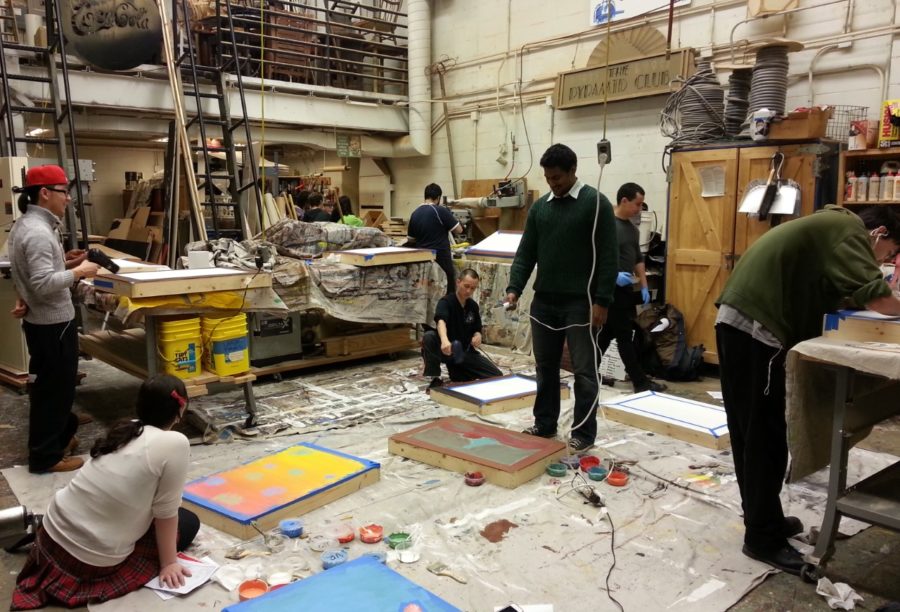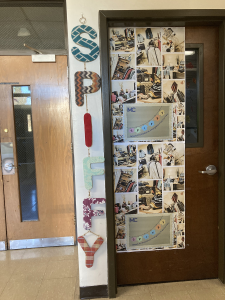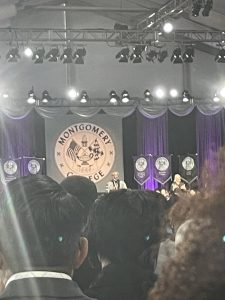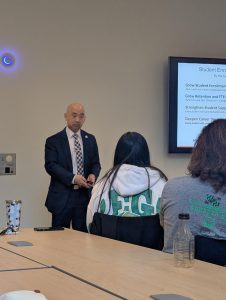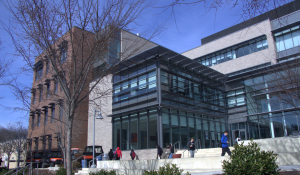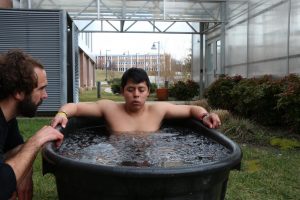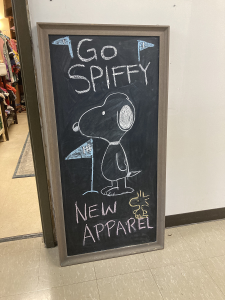More Than an Act: Pursue a Theater Major!
MC Advocate Series on Reporting the Lesser-Known Departments of Montgomery College.
Costume and Crafts students collaborate on painting their latest carpentry project, a piece of a set exhibit. 2022. Photo by R. Scott Hengen.
March 23, 2022
“If you’re waiting tables, that’s performance. If you’re a Physician’s Assistant or an RN, those are empathy skills that we learn in performance. If you’re working in the housing industry, then carpentry skills are used in performance. If you’re at a Convention Center working with Congress, those skills you learn in the theatre department. Just being a human being in general, man. Electricians, dealing with lighting, electricity, amplification, and sound could be a speech therapist position or a music person at a concert.” R. Scott Hengen, Technical Theatre Professor and Production Coordinator, wants Montgomery College to know that the niche of technical theatre classes is not just about building a set, but about building a foundation to compose your greater future.
“Name one part of your body that is speaking to you right now,” directed Sollis Pettit, a Montgomery College Theater major. “This is how Fundamentals of Acting students confront their deepest emotions at eight in the morning.” — “And under great pressure of having projects completed punctually for the team,” Charlie Dicken chimed in, an ambitious performing arts student. This is the body part monologue: one of the many movements projects that theater students bond over.
What if up is down, stage right is stage left; and stage left, right? “There’s a lot of superstition in theater,” Pettit laughed. “Due to superstition, do not use the word ‘Go’; rather, spell it, ‘G-O’, in fear something might happen,” warned Professor Hengen.
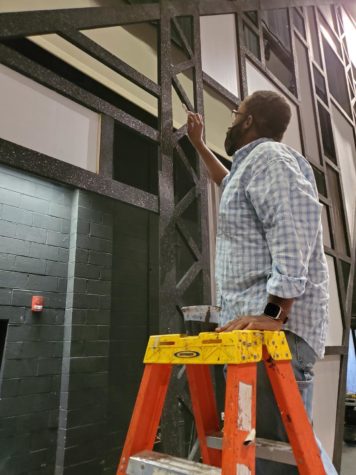
Multicultural festivals, monologues, and phlebotomy certifications are some of the many events and happenings that take place in the TA building on the Rockville campus. “The big sign right outside of campus, always talking about majors, has been running ads for however many STEM classes for the longest time, and the Science Center has that giant dinosaur in their building. Yet, our stage, which trains some of the most successful performers in the Washingtonian region, is falling apart,” explained Pottitt. Due to insufficient promotion, the program lacks proper funds. But this year, MC’s Theater Program is searching for students who are serious about theatre.
Apart from the hard skills learned in stagecraft, any interaction a performer has in their life can be translated back to the theatre. Hengen detailed that MC Theatre course ethos can be applied in church, at home, or even in the grocery store. There is irreplaceable energy of connecting directly with an audience, as well as your crewmates. “Theater is more about whom you know, not what you know. Friends are family. Students trust their professors enough to be on a first-name basis, and even friends on Facebook,” says Sam Gatica, Montgomery College’s Stage Manager.
As an example of the personal bonds provided by the THET course at MC: a 70-year-old woman named Ann audits theater courses for recreation. This is where she met Sollis Pettitt, a dog trainer at Rivermist, Black Box actor, and MC Stagecraft alumni. Having met in MC classes and established a friendship, Sollis now lives with her. Sollis greatly struggled with physical and verbal communication, and it took a large toll on functioning in his everyday life. Through the power of performing arts education, he has acquired the confidence needed to navigate everyday life.
When asked about their grades within theater courses, a group of technicians answered, “[You get] As, if you put in the work.” However, many students audit these courses out of personal interest, and nonmajors may take the low-level courses as transferrable general electives.
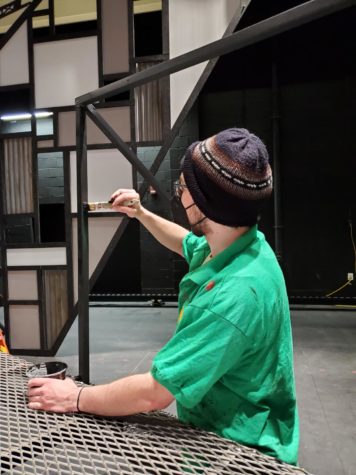
THET 230: Costumes and Crafts, is a survey through the entire backstage procedure: business, carpentry, costume, dance, lighting, sound, stage fabrics, painting, programming, and performance. “It shows you all the backstage areas, but also how the show comes from idea to finished product, through painting a flat, and helps you become a part of the crew for the show,” Professor Hengen says. Additionally, he urges everyone to take THET 114: Stagecraft as a prerequisite to what he calls ‘criminally underattended lighting, sound design, and other technical courses’. In this course, students work in a shop to sew, research, design, picture, and collaborate with actors based on their individuality.
THET 230 is currently preparing its creative students for their Spring 2022 performance. Regardless of their major, these students are encouraged to participate in the lighting section of the tech crew, in addition to taking the class.
Generic academia happens in biological laboratory classrooms and presentations on Smart Boards, however, these courses are all about getting creative, dramatic, and sweaty. As the stage crew works on the set for the next production, the classrooms of TA are full of blueprints, sweat, power tools, and wires. THET 216: Stage Lighting, is an introduction to the inner lighting board, which involves controlling custom colors and lights on the main stage. The theatre department’s next play is seeking electricians to control the stage light fixtures. Training is provided on the job! According to current students, this activity is quite therapeutic and could serve as a fun side-project, or another way to get more involved with the MC community.
Theater Arts 148, the acting classroom, hosts THET 110: Fundamentals of Acting. This course is all about speech, movement, imagination, and improvisation. Any student who takes this course will walk away with an active imagination and their creative ideas indulged. THET 110 is the theater class that attracts the most non-performing arts majors, as it fills an arts general education requirement. Many non-majors leave this class surprised by its unexpected transformative powers. The theater is like an insider’s secret society – kind of like Crossfit. People take the course merely for the easy A, but they end up enjoying themselves more than anticipated and using their new performance skills forever.
Theater Arts Room 144 is bustling with a flash mob of an improvisational acting group, laughter, colorful clothes, and body language practice. These performers are happy to perform in a flash mob to collaborate at any event. Their willingness to collaborate might make provide a fun way to commemorate certain club occasions and events on campus!
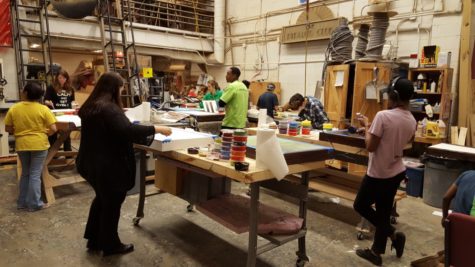
Regarding professors, Paul Moudoki, a theatre major, recommends Professor Aaron Sasha, affectionately referred to by students as “Teddy Bear”. Professor Sasha teaches COMM 109 and COMM 112. The former course focuses on voice and diction, while the latter on professional and business speech communication. Communication skills are one of the most important skills one can learn in college, and being able to effectively speak both intrapersonally and interpersonally is imperative to future careers in all fields. Thanks to these courses, theatre majors have mastered this.
In addition, Moudoki recommends Professor KenYatta Rogers. This semester, Professor Rogers is teaching three courses: THET 201: Intermediate Acting; THET 237: Fundamentals of Play Directing, THET 295: Theater Internship. THET 295 is an upper-level course that requires an independent proposal and is restricted to second-year students who have completed at least 24 credits, maintain a 3.2 GPA, and earn the approval of the department.
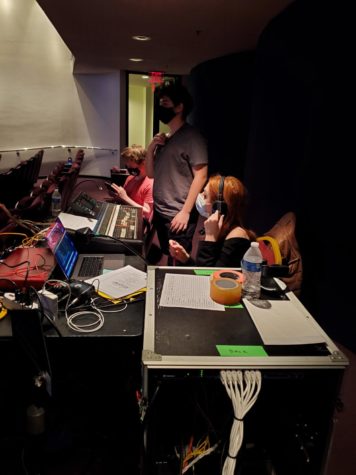
Ayesha, a student performer, also discussed her experience with professors in the theatre department. “I took [COMM] 109 with [Professor] Sasha; History of Theater, THET 100 with [Professor] Miller; and Stagecraft with [Professor] Hengen.” Additionally, Ayesha expressed gratitude for the skills she unintentionally acquired from remote learning. “I still had fun, but the way you interact with actors over Zoom made it harder. Stagecraft really opened my eyes to more technology; I’m mostly a performer, and it made me feel like a techie.” THET 100: Introduction to Theatre covers a broad introduction to the eras and facets behind performing arts. Professor Laura Miller’s course fulfills both the Arts and Global and Cultural Perspective Requirements. Professor Miller also teaches THET 125: Script Analysis, a study of script structure.
Montgomery College’s theater majors successfully find employment at local companies and the major guarantees post-graduation success. Those who study theatre at Montgomery College may go on to intern and work at hotspots such as Broadway, the Dallas Center, Design Foundry, Kennedy Center, the Olney Theatre, Roundhouse Theatre, and Theatre J.
Successful alumni include:
- Jose Abraham, who received a Bachelor of Arts from the University of Illinois; now the Technical Director at Roundhouse Theatre.
- Sam Crawford is an Assistant Stage Manager (ASM) at the University of Maryland and tutors in other fields.
- Brian Boyd worked as an ASM and took the Stagecraft course at MC.
- Sam Lincoln is finishing their technical theatre degree at UMD as an ASM.
- Rue Skyler is a props designer who works at the Gala Theater and the Kennedy Center.
MC Alumni can be spotted working in box offices, lighting design, scenic art, and projection. According to Professor Hengen, “If you go to any theatre around the DC area, you will find at least one MC graduate employed there, and the communication and technology skills you learn in theater apply to every other industry in the DC area.”
“Every job I got after college was through the [theatre community] here,” attested one female alumni, Ren Quinn, who worked on the set for the department’s most recent production, “Working”.
The MC Theatre department’s latest production, “Electricidad”, a Shakespearean tragedy representing Latinx and women, premieres Thursday, April 21st at 8:00 pm, and runs until the 24th at 2:00 pm in the Rockville’s Parilla Performing Arts Center. Also, keep an eye out for MC’s dance performances, including Symphony of the Potomac, premiering on April 3rd. General tickets cost $5.00, and the MC community is encouraged to attend in support of the Theatre Department.
Professor Hengen invites all students to join or hang out with Black Box Players, the all-inclusive college theatre club. Black Box Players meets every other Friday at 11:30 AM in the TA building on the Rockville campus. The club runs annual holiday parties, hosts workshops, has a heavy social media presence, and sponsors a Spring Break trip to Broadway in New York. All students, regardless of major, are invited to join! An additional incentive: the club is catered!


